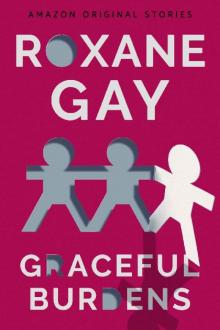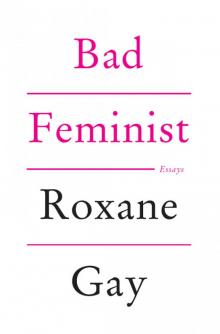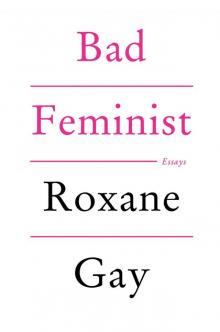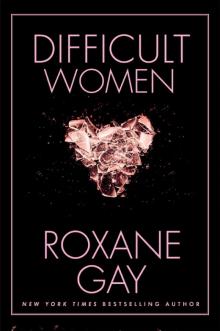- Home
- Roxane Gay
Hunger Page 8
Hunger Read online
Page 8
For years at a time, there was me, and the woman I saw myself as while living in my head, and the woman who had to carry around my overweight body. They were not the same person. They couldn’t be, or I wouldn’t have survived any of it.
31
When you’re overweight, your body becomes a matter of public record in many respects. Your body is constantly and prominently on display. People project assumed narratives onto your body and are not at all interested in the truth of your body, whatever that truth might be.
Fat, much like skin color, is something you cannot hide, no matter how dark the clothing you wear, or how diligently you avoid horizontal stripes. You may become very adept at playing the role of wallflower. You may learn how to be the life of the party so that people are too busy laughing at or with you to focus on the elephant in the room. You may do whatever you have to do to survive a world that has little patience or compassion for a body like yours.
Regardless of what you do, your body is the subject of public discourse with family, friends, and strangers alike. Your body is subject to commentary when you gain weight, lose weight, or maintain your unacceptable weight. People are quick to offer you statistics and information about the dangers of obesity, as if you are not only fat but also incredibly stupid, unaware, delusional about the realities of your body and a world that is vigorously inhospitable to that body. This commentary is often couched as concern, as people only having your best interests at heart. They forget that you are a person. You are your body, nothing more, and your body should damn well become less.
32
An epidemic is the spread of a contagion. It is the unstoppable march of an infectious disease across humanity. Throughout history, there have been many epidemics—measles, influenza, smallpox, the bubonic plague, yellow fever, malaria, cholera—but none is so deadly and pervasive, according to countless news reports, as the obesity epidemic. Instead of fever, leaking pustules, swollen glands, or lesions, your symptoms are girth and sheer mass. The obese body is the expression of excess, decadence, and weakness. The obese body is a site of massive infection. It is a losing battleground in a war between willpower and food and metabolism in which you are the ultimate loser.
Rarely does a day go by, particularly in the United States, without some new article discussing the obesity epidemic, the crisis. These articles are often harsh, alarmist, and filled with false concern for people afflicted by this epidemic and a profoundly genuine concern for life as we know it. Oh, the burdens on the health-care system, these articles lament. Obesity, these articles ultimately say, is killing us all and costing us an unacceptable fortune.
There is, certainly, a very small grain of truth in these articles, in this frenzied panic. And also, there is fear, because no one wants to be infected by obesity, largely because people know how they see and treat and think about fat people and don’t want such a fate to befall them.
33
As a fat woman, I often see my existence reduced to statistics, as if with cold, hard numbers, our culture might make sense of what hunger can become. According to government statistics, the obesity epidemic costs between $147 and $210 billion a year, though there is little clear information as to how researchers arrive at that overwhelming number. What exactly are the costs associated with obesity? The methodology is irrelevant. What matters is that fat is expensive and therefore a grave problem. Fat people are a drain on resources, what with needing health care and medication for their all too human bodies. Many people act like fat people are reaching directly into their wallets, the fat of other people a burden on their personal bottom line.
Statistics also reveal that 34.9 percent of Americans are obese and 68.6 percent of Americans are obese or overweight. The definitions of “overweight” and “obese” are often vague and obscured by arbitrary measures like BMI or various other indexes. And this just in: the obesity epidemic has recently crossed the Atlantic Ocean, and now many Europeans are falling prey to what is quickly becoming a pandemic—an epidemic of global proportions. What matters most is that too many people are fat. The epidemic must be stopped, by any means necessary.
34
Few areas of popular culture focus on obesity more than reality television, and that focus is glaring, harsh, often cruel.
The Biggest Loser is an unholy union of capitalism and the weight-loss industrial complex. On the surface, The Biggest Loser is a television show about weight loss, but really, it’s anti-obesity propaganda, offering wish fulfillment for people with unruly, overweight bodies, both on the show and in the viewing audience. The show allows the home viewer to feel motivated without actually doing anything. If the viewer does get motivated, they can participate at home and feel like they are, in some small way, part of the show. Meanwhile, they also have the satisfaction of watching fat people become less fat from one week to the next while competing for $250,000.
I watched the first few seasons of The Biggest Loser avidly. The show offered the ultimate fat-girl fantasy—you go to a “ranch” for a few months, and under the pressure of intense personal trainers, dangerously low caloric intake, the manipulations of reality show producers, and the constant surveillance of television cameras, you lose the weight you’ve never been able to lose on your own.
During those first few seasons, I often toyed with the idea of auditioning to appear on the show, though, realistically, that could never happen. I’m too shy. I would go through withdrawal from the Internet. I can’t work out without music. If Jillian Michaels screamed at me, I would shut down or cry like a baby or strangle her. At the time, I was a vegetarian and I was concerned because I don’t eat Jennie-O turkey, a product the show shamelessly hawked for years by way of product placement. Appearing on the show simply was not and is not feasible for me.
The longer The Biggest Loser has been on the air, however, the more the show has disturbed me. There is the constant shaming of fat people and the medical professionals who take every opportunity to crow about how near death these obese contestants are. There are the trainers, with their undeniably, implausibly perfect bodies, demanding perfection from people who have, for whatever reason, not had a previously healthy relationship with their bodies. There is the spectacle of the contestants pushing themselves in inhuman ways—crying and sweating and vomiting—visibly purging their bodies of weakness. This is not a show about people becoming empowered through fitness, though the show’s slick marketing would have you believe that.
The Biggest Loser is a show about fat as an enemy that must be destroyed, a contagion that must be eradicated. This is a show about unruly bodies that must be disciplined by any means necessary, so that through that discipline, the obese might become more acceptable members of society. They might find happiness, which can, according to the show, according to cultural norms, only be found through thinness. When we watch shows like The Biggest Loser and its many imitators, we are practically begging some power beyond ourselves, “Take these all too human bodies, and make what you will of them.”
With the dramatic reveal of Rachel Frederickson, the Season 15 winner of The Biggest Loser, those of us who watch finally had an unimpeachable reason to be visibly outraged about the show and its practices, even though the show has been on the air and offering a damaging narrative about weight loss since 2004.
When her season began, Frederickson weighed 260 pounds. At her final weigh-in, on live television, she weighed 105, a 60 percent loss in mere months. During this reveal, even trainers Bob Harper and Jillian Michaels gaped at Frederickson’s gaunt body. She had disciplined her body the way she’d been asked to, but apparently, she had disciplined her body a bit too much. The biggest loser, we now know, should lose, but only so much. There are so many rules for the body—often unspoken and ever-shifting.
In an interview, Harper would later say, “I was stunned. That would be the word. I mean, we’ve never had a contestant come in at 105 pounds.” There was a wide range of responses in the press and on social media in the wake of se
eing Rachel Frederickson’s new body. Her body, like most women’s bodies, instantly became a public text, a site of discourse, only now because she had taken her weight loss too far. She had disciplined her body too much.
As of late, several former contestants have leveled many accusations against the show, alleging that producers used forced dehydration, severely restricted caloric intake, and encouraged the use of weight-loss drugs and more to help contestants reach their goals, to make for better television. Even more damning was a medical study of one season’s participants, led by metabolism expert Kevin Hall. The study found that thirteen of the fourteen contestants’ metabolisms continued slowing even after their significant weight loss. This slowed metabolism contributed to the contestants gaining back most, if not all or more, of the weight they had lost on the show. The results are a stark reminder that weight loss is a challenge that the medical establishment has not yet overcome. It is certainly not a challenge a reality television show has overcome. It’s no wonder that so many of us struggle with our bodies.
In the two months after her big reveal, Frederickson gained twenty pounds and reached, apparently, a more acceptable but still appropriately disciplined size. She explained that she lost so much weight because she was trying to win the $250,000 prize, but those of us who deny ourselves and try so hard to discipline our bodies know better. Rachel Frederickson was doing exactly what we asked of her, and what too many of us would, if we could, ask of ourselves.
35
There are any number of weight-loss shows in the vein of The Biggest Loser. On Extreme Makeover: Weight Loss, the show takes a slightly more realistic approach to the project of significant weight loss, following fat people on their “weight-loss journey” over a year. The trainer is far more genial than those on The Biggest Loser. We see more of the genuine struggle of weight loss, how it’s not something that can be neatly accomplished and packaged for a televised audience. The message, though, is the same—that self-worth and happiness are inextricably linked to thinness.
Some shows are hell-bent on exploitation. On Fit to Fat to Fit, physically impeccable trainers gain weight so they can better empathize with their clients. Then they have to lose the weight again so as to return to their natural, more perfect forms. The show chronicles their initial joy of eating with abandon, followed by the apparent misery of having to eat fast food and being fat, and finally the lasting satisfaction of these trainers returning to their preferred state of impeccable fitness. Their clients are, by and large, accessories to the tragic, then triumphant gain-loss narrative the show loves.
Khloé Kardashian, who has often been tormented by tabloids for weighing a bit more than 110 pounds, is hosting a show for E! called Revenge Body, where participants get revenge on someone who has wronged them by losing weight and getting into shape. It’s a hell of a thing, this idea that the way to truly settle old scores is to get thinner and fitter. The very premise of the show suggests that if you’re fat, the people who have wronged you are probably gloating and reveling in your circumstance.
On My 600-lb Life, the show’s morbidly obese subjects travel to Houston, where one Dr. Younan Nowzaradan—or Dr. Now, as he is often called—performs weight-loss surgery on them. On this show, fat is treated as a pitiable spectacle. My 600-lb Life revels in the stories of people who are so overwhelmed by their unruly bodies that they often have to be helped out of their homes by EMTs. They are at the point of no return, their bodies failing them, their loved ones exasperated and ready to walk away. The fat people on this show eat outrageous quantities of food and are often suffering from unresolved trauma. They also suffer from any number of physical ailments. They are, in many ways, cautionary tales. Watch her, out of breath, making her way to the mailbox. Watch him, sunken into the couch, eating from a greasy bag of hamburgers. Watch her struggle to get in and out of her car, the steering wheel choking her gut. We see these people at their most vulnerable, in ill-fitting, often oversized clothes, if they can even wear clothes, their corpulence spreading everywhere, defying convention, defying our cultural norms.
Each episode has a very familiar narrative arc, in which we meet the subject and learn about their life, the seemingly miserable limitations of it. Then they meet Dr. Now, who chastises them and their loved ones for letting things get so out of hand. He tends to be palpably distressed by his patient and their family. Dr. Now often requires that these people go on a 1,200-calorie-a-day diet so they can lose fifty pounds before he will perform the weight-loss surgery. He does the surgery and it always goes well and then the subject sees a therapist and stumbles along trying to live and eat differently. This show loves to gratuitously display the fat body, all the excess, the mounds of flesh. The surgeries are graphic, and we see insides, globules of fat being shoved aside by medical instruments, as the obese body is medically brought to heel. Through medical intervention, the show offers redemption or, at least, a chance at redemption. Each episode tries to end on a hopeful note, but sometimes, even with medical intervention, there is no happy ending, which for the show is a drastically thinner body. In that, My 600-lb Life offers some truth.
I hate these shows, but clearly I watch them. I watch them even though sometimes they enrage me and sometimes they break my heart and all too often they reveal painfully familiar experiences of loneliness, depression, and genuine suffering born of living in a world that cannot accommodate overweight bodies. I watch these shows because even though I know how damaging and unrealistic they are, some part of me still yearns for the salvation they promise.
36
It’s not just reality TV that is obsessed with weight. If you watch enough daytime television, particularly on “women’s networks,” you are treated to an endless parade of commercials about weight-loss products and diet foods—means of disciplining the body that will also fatten the coffers of one corporation or another. These commercials drive me crazy. They encourage self-loathing. They tell us, most of us, that we aren’t good enough in our bodies as they are. They offer us the cruelest aspiration. In these commercials, women swoon at the possibility of satisfying their hunger with somewhat repulsive foods while also maintaining an appropriately slim figure. The joy women express over fat-free yogurt and 100-calorie snack packs is not to be believed. Every time I watch a yogurt commercial I think, My god, I want to be that happy. I really do.
It is a powerful lie to equate thinness with self-worth. Clearly, this lie is damn convincing because the weight-loss industry thrives. Women continue to try to bend themselves to societal will. Women continue to hunger. And so do I.
In one of her many commercials for Weight Watchers, Jessica Simpson smiles brightly and says, “I started losing weight right away. I started smiling right away.” In her commercials for Weight Watchers, Jennifer Hudson shrieks about her newfound happiness and how, through weight loss—not, say, winning an Oscar—she achieved success. These are just two of many weight-loss advertisements that equate happiness with thinness and, by the law of inverses, obesity with misery.
Valerie Bertinelli was a Jenny Craig spokeswoman who proudly showed off her “new body” in 2012. Though she lost forty pounds, she then gained some of that weight back. For that crime, her penance was to go on the talk show circuit, trying to fight fat shaming. She would, of course, eventually head back to the gym when her press tour was over. She wanted, according to ABC News, to be “back in bikini shape by summer.” Kirstie Alley also rejoined the Jenny Craig fold around that time. “Without a coach helping us along the way, I don’t think someone can make it for the long haul,” Alley said. The public weight-struggle spectacle is a popular fallback for once-famous women who yearn to recapture their former glory.
Women, for that is whom these ecstatic diet food commercials and celebrity weight-loss endorsements are for, can have it all when they eat the right foods and follow the right diets and pay the right price.
What does it say about our culture that the desire for weight loss is considered a default feature of wo
manhood?
37
For most of my life, Oprah Winfrey has been a cultural icon who publicly struggles with her weight. For most of my life I have also struggled with my weight, though, mercifully, out of the public eye. Oprah has lost weight and celebrated that victory. She has gained weight and lamented that failure. In 1988, when her talk show was at the height of its popularity, she lost nearly seventy pounds on a liquid diet. She dragged a bright red Radio Flyer wagon filled with animal fat onto the stage of her show. She was resplendent, hair teased high, black turtleneck, tight jeans, as she performed her disgust at the spectacle of such fat, straining to try and lift the bag from the wagon. She was performing penance for the sin of having been fat.
This is the woman who brought us the idea of living our best life, of becoming our most authentic selves. And yet. In 2015, Winfrey bought a 10 percent stake in Weight Watchers, an investment of $40 million. In one of her many commercials for the brand, she says, “Let’s make this the year of our best body.” The implication is, of course, that our current bodies are not our best bodies, not by a long shot. It is startling to realize that even Oprah, a woman in her early sixties, a billionaire and one of the most famous women in the world, isn’t happy with herself, her body. That is how pervasive damaging cultural messages about unruly bodies are—that even as we age, no matter what material successes we achieve, we cannot be satisfied or happy unless we are also thin.

 Graceful Burdens (Out of Line collection)
Graceful Burdens (Out of Line collection) The Best American Short Stories 2018
The Best American Short Stories 2018 Bad Feminist
Bad Feminist Bad Feminist: Essays
Bad Feminist: Essays Ayiti
Ayiti Difficult Women
Difficult Women An Untamed State
An Untamed State Hunger
Hunger